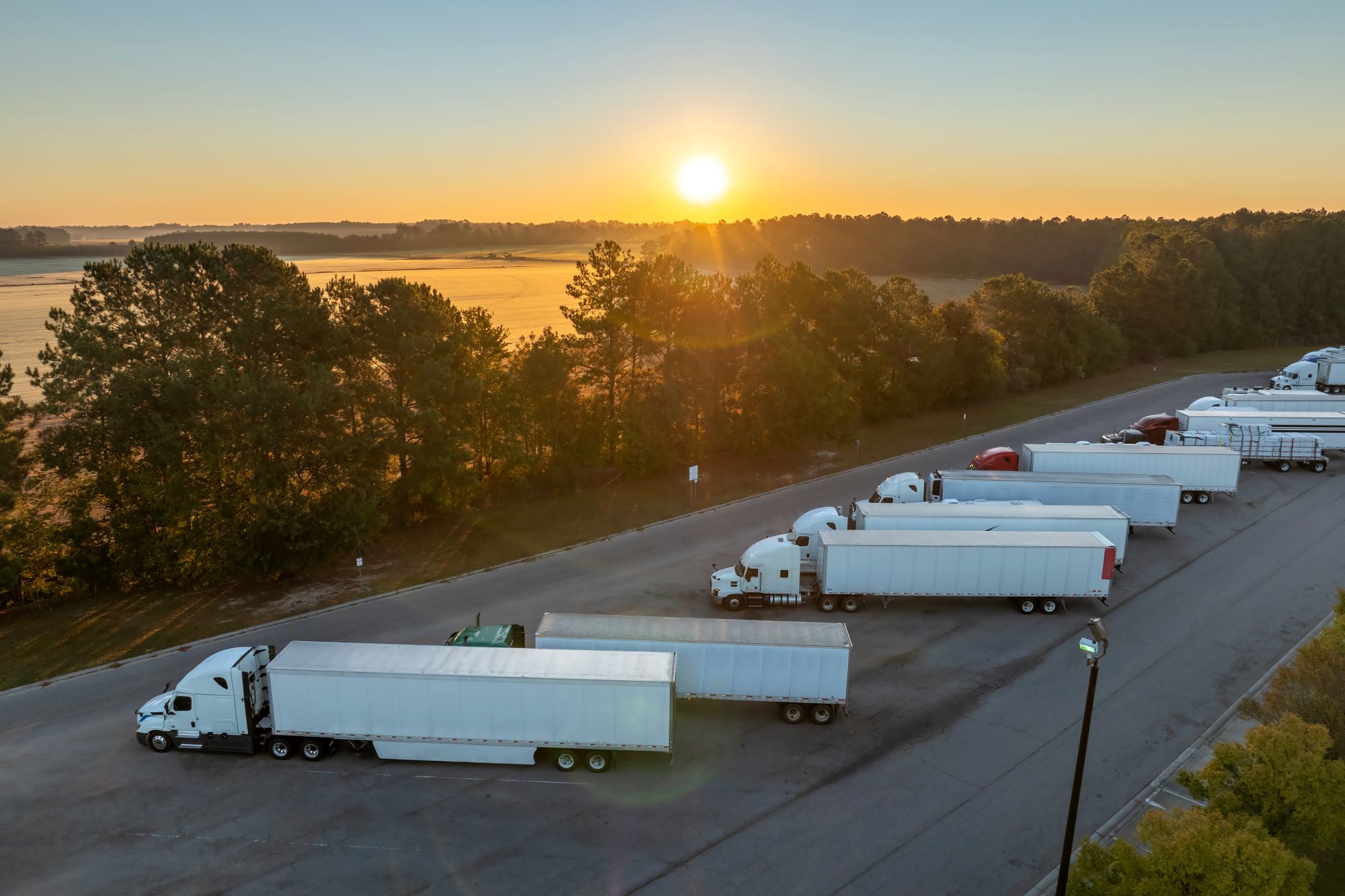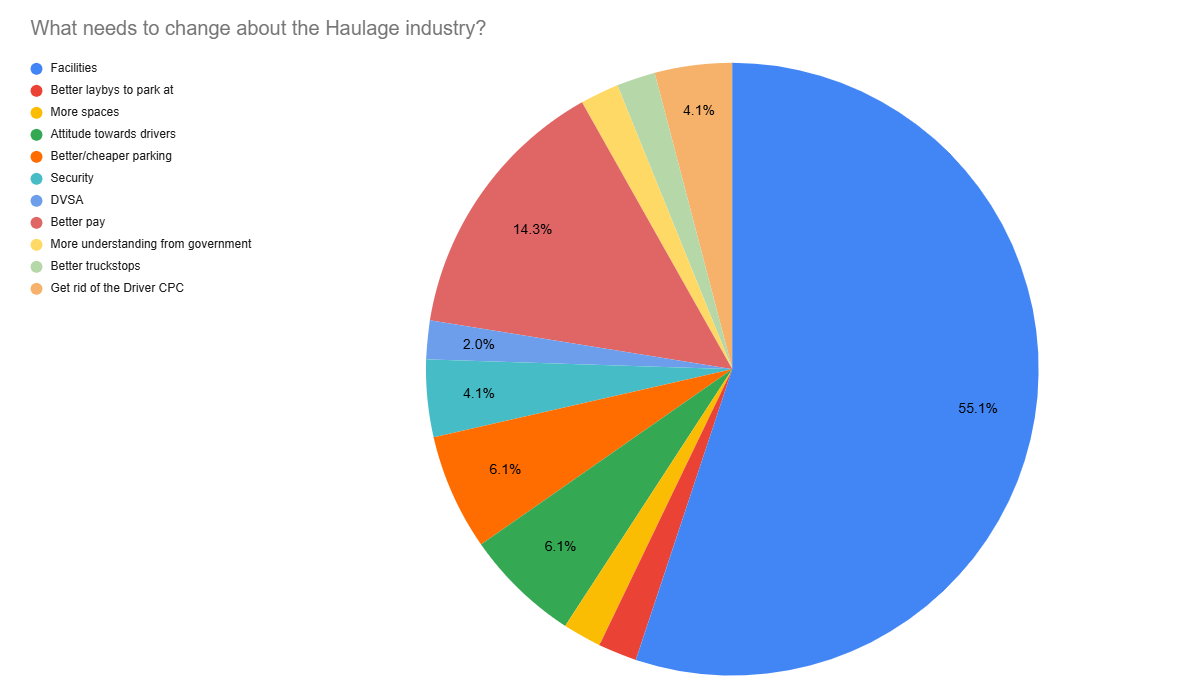
Susie Jones
Vodiči nákladných vozidiel žiadajú reformu odvetvia
Vytvorené: 05. 02. 2025
•
Aktualizované: 05. 02. 2025
V súčasnosti tvoria ženy-vodičky nákladných vozidiel v Spojenom kráľovstve len 1 % všetkých vodičov - toto číslo sa za posledné desaťročie zvýšilo o 144 %, keďže sa zaviedlo viac iniciatív na podporu rozmanitosti a odstránenie nedostatku vodičov.
Článok Fleetpoint opisuje mnohé spôsoby, ako by odvetvie mohlo prilákať viac žien do odvetvia:
Vytváranie priaznivého a príjemného pracovného prostredia.
Modernizácia infraštruktúry a vybavenia.
Flexibilné a rodinné pracovné podmienky.
Vytváranie jasných ciest pre kariérny rast.
Napriek tomu vodiči na sociálnych sieťach tvrdili, že tieto dlhodobé problémy v odvetví sa musia riešiť pre všetkých skôr, ako sa zavedú nové iniciatívy na odstránenie nedostatku vodičov.
Nedostatok vodičov - kde je teraz priemysel?
Nedostatok vodičov bol pre odvetvie dopravy pretrvávajúcim problémom, ale po COVID-19 a brexite dosiahol kritickú úroveň. V roku 2024 chýbalo v Európe, Nórsku a Spojenom kráľovstve viac ako 233 000 vodičov nákladných vozidiel - tento počet by mal do roku 2028 presiahnuť 745 000 v dôsledku starnutia pracovnej sily.
Odvetvie sa stále vyrovnáva s dôsledkami a pracuje na zavedení nových iniciatív na podporu rozmanitosti, zlepšenie pracovných podmienok a odstránenie rozdielov v počte pracovníkov.
Vláda zaviedla zhruba [33](https://www.gov.uk/government/topical-events/hgv-driver-shortage-uk-government-response/about#:~:text=We%20extended%20dangerous%20goods%20(ADR,to%20take%20refresher%20training%20now.) opatrenia na riešenie nedostatku vodičov nákladných vozidiel v Spojenom kráľovstve. Patria sem okrem iného tieto opatrenia:
Zvyšovanie efektívnosti existujúcich dodávateľských reťazcov.
Poskytovanie podpory a školenia pre nových vodičov nákladných vozidiel.
Rozšírenie kapacity testovania vodičov ťažkých nákladných vozidiel.
Zlepšenie procesov udeľovania licencií.
Zlepšenie podmienok.
Zabezpečenie stability dodávateľského reťazca pohonných hmôt.

Čo je potrebné zmeniť? Vodiči sa vyjadrili.
49 % vodičov na sociálnych sieťach uviedlo, že zmeny sa musia zaviesť bez ohľadu na pohlavie - 27 % vodičiek nákladných vozidiel súhlasilo s tým, že sektor sa musí vyvíjať pre všetkých. 24 % uviedlo, že táto práca už nie je atraktívna, čo poukazuje na potrebu zmien v tomto odvetví. Čo teda chcú vodiči zmeniť?
Zariadenia
55 % respondentov si želá zlepšenie vybavenia pre všetkých:
"Je potrebné lepšie vybavenie a lepšie zaobchádzanie. Celé odvetvie je v chaose a zle sa s nami zaobchádza."
"Vybavenie je hrozné pre všetkých vodičov, mužov aj ženy."
V novembri 2024 sa v prieskume Transport Focus zistilo, že dve tretiny vodičov sú nespokojné so zariadeniami zastávok pre nákladné vozidlá - značné problémy spôsobuje špinavé vybavenie, nedostatočné možnosti stravovania a nedostatok spoločenského priestoru.
Vláda a odvetvie nákladnej dopravy prijali významné opatrenia a investovali 14 miliónov libier na podporu inovácií a zlepšenie pracovných podmienok.
V októbri 2024 získalo 23 úspešných žiadateľov až 4,5 milióna libier na zlepšenie svojich zastávok pre nákladné vozidlá. Modernizácia bude zahŕňať nové sprchy, reštaurácie a vylepšené bezpečnostné prvky, ktoré vodičom poskytnú väčší pokoj. Okrem toho sa v rámci programu vytvorí približne 430 parkovacích miest pre ťažké nákladné vozidlá.
Pay
Na druhom mieste v rebríčku sa umiestnili lepšie mzdy, pričom 14 % vodičov uviedlo, že zvýšenie miezd by ich povzbudilo k vstupu do odvetvia:
"Urobte ju atraktívnou pre všetkých, zvýšte mzdy."
Zvyšovanie miezd bude pre vedúcich predstaviteľov odvetvia znamenať značné náklady. Ak by sa priemerná mzda vodiča nákladného vozidla zvýšila v súlade s národnou mzdou na úrovni životného minima, prevádzkovatelia vozových parkov by mohli ročne získať 1,5 miliardy GBP navyše.
Napriek tomu investície zlepšia mieru udržania zamestnancov, znížia náklady na nábor a náklady na školenia. Ponuka vyšších platov by nielen zatraktívnila toto povolanie pre nových záujemcov, ale aj ocenila kľúčovú úlohu, ktorú vodiči zohrávajú pri udržiavaní dodávateľského reťazca.
Prístup k vodičom
Názory verejnosti na vodičov nákladných vozidiel sa v priebehu rokov výrazne zmenili. Život vodičov nákladných vozidiel bol často romantizovaný vo filmoch a populárnych médiách, čo viedlo mnohých k presvedčeniu, že to majú ľahké. Zároveň ich však prezentovali ako tvrdo pracujúcich hrdinov, čo je obraz, ktorý sa časom zhoršil.
Koncom 20. storočia sa vnímanie zmenilo, pretože pracovné podmienky sa sťažili a o vodičoch nákladných vozidiel sa začali vytvárať nespravodlivé stereotypy - často v dôsledku skreslených informácií v médiách a niekedy aj v dôsledku niekoľkých neskúsených vodičov. Tieto negatívne stereotypy sa zmiernili počas pandémie COVID-19, keď sa zvýšilo uznanie verejnosti pre vodičov nákladných vozidiel.
V súčasnosti si vodičov nákladných vozidiel vážime, avšak toto odvetvie je stále poznačené negatívnymi stereotypmi a postojmi. 6 % vodičov by si želalo, aby sa to zmenilo:
"Keď si spomeniem na Covid, považovali nás za hrdinov, ale potom sa všetko vrátilo do normálu. Niet divu, že súčasní vodiči, muži aj ženy, chcú z tohto odvetvia odísť. Majú plné zuby toho, s akým odpadom sa denne stretávajú."
"Bolo by pekné, keby sa k tebe nesprávali ako k spodine."
V posledných rokoch začali sociálne médiá spochybňovať a meniť negatívne vnímanie. Mnohí vodiči sa na platformách, ako sú TikTok a Instagram, delia o svoje postrehy, vyvracajú mylné predstavy a získavajú si rešpekt od ľudí mimo odvetvia.
Spätná väzba ukazuje, že odvetvie nákladnej dopravy naliehavo potrebuje zaviesť zmeny, aby prilákalo a udržalo si existujúcich a nových vodičov. Nedostatočné zastúpenie žien zostáva významnou výzvou a investície do zariadení, ktoré vyhovujú ich potrebám, sú kľúčové. Tieto investície však musia byť inkluzívne a prospešné pre celú pracovnú silu.

V ktorých krajinách je nedostatok vodičov nákladných vozidiel?
Najviac boli postihnuté krajiny v Európe, kde mnohé dopravné spoločnosti nemôžu rozšíriť svoje podnikanie, pretože nemôžu nájsť kvalifikovaných pracovníkov.
Populácia vodičov nákladných vozidiel v Európe starne, pričom ich priemerný vek je 47 rokov(https://www.iru.org/news-resources/newsroom/half-european-truck-operators-cant-expand-due-driver-shortages#:~:text=The%20EU%2C%20Norway%20and%20the,an%20average%20age%20of%2047.). Jedna tretina vodičov nákladných vozidiel má viac ako 55 rokov a očakáva sa, že v nasledujúcich desiatich rokoch odíde do dôchodku. Okrem toho menej ako 5 % vodičov nákladných vozidiel v Európe má menej ako 25 rokov - čo poukazuje na medzeru, ktorá vznikne po odchode starnúcej pracovnej sily do dôchodku.
Existuje deň ocenenia vodičov nákladných vozidiel?
Deň vodičov nákladných vozidiel sa koná 22. januára a bol založený spoločnosťou NN1 Personnel. Cieľom tohto dňa je osláviť vodičov nákladných vozidiel a všetko, čo robia pre hospodárstvo a spoločnosť.
Aký je výhľad odvetvia nákladnej dopravy na rok 2025?
Z nášho blogu The Road Ahead for 2025 očakávame, že v tomto roku budú v odvetví nákladnej dopravy významné nasledujúce skutočnosti:
Využívanie výhod umelej inteligencie.
Riešenie rodových rozdielov a nedostatku vodičov.
Podpora ekologickejšieho priemyslu.
Zvyšovanie objemu diaľkovej nákladnej dopravy.


